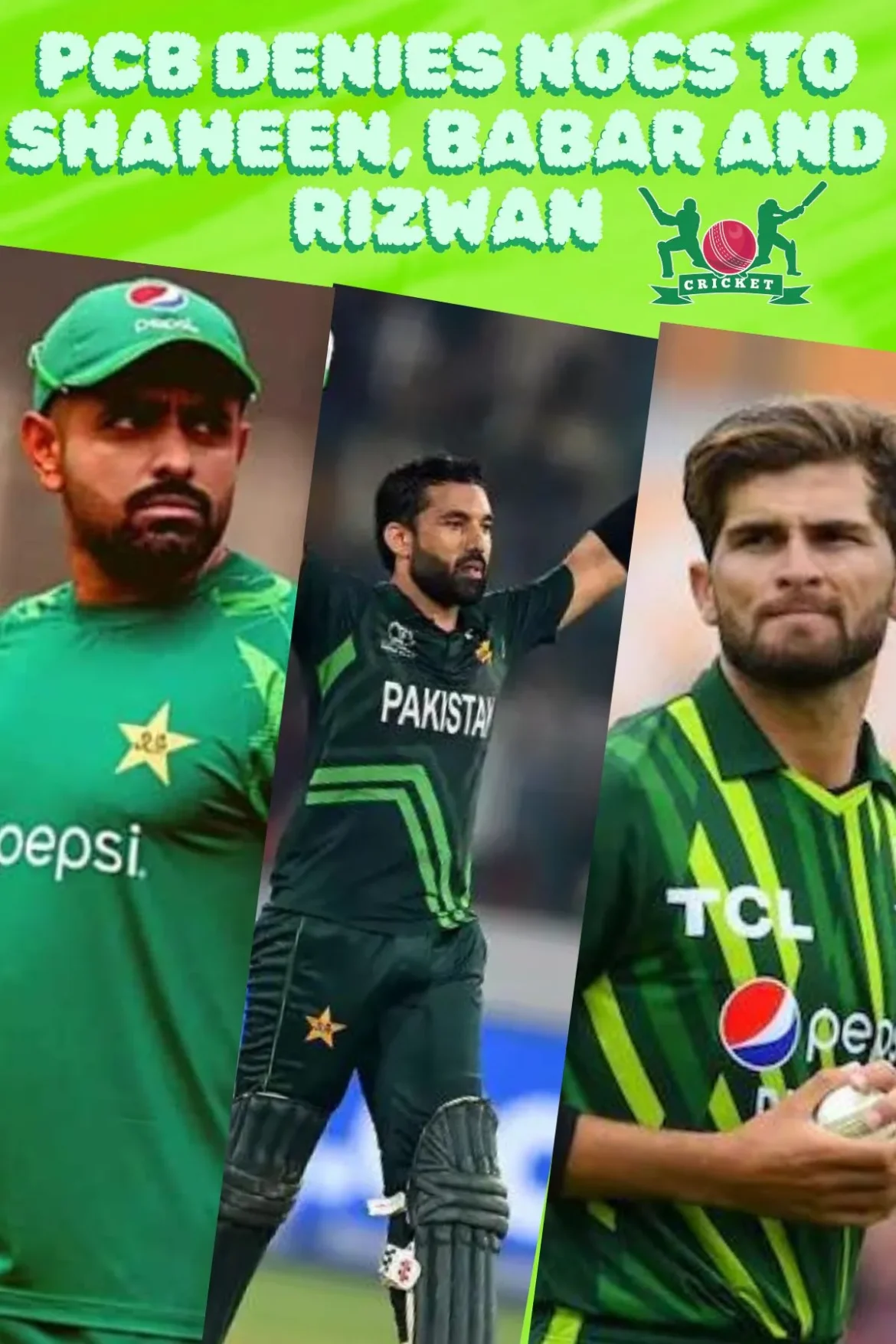The Pakistan Cricket Board’s (PCB) denies No-Objection Certificates (NOCs) to three of Pakistan’s prominent cricketers—Shaheen Shah Afridi, Babar Azam, and Mohammad Rizwan—for the Global T20 Canada 2024 has stirred considerable debate. To begin with, this blog delves into the implications of this decision, its broader context, and its potential impact on Pakistani cricket.
1. The PCB’s Decision: An Overview
The Pakistan Cricket Board (PCB) has decided against issuing NOCs to Shaheen Shah Afridi, Babar Azam, and Mohammad Rizwan for the upcoming Global T20 Canada 2024. The board’s decision, communicated through a press release. That cites a crowded international schedule from August 2024 to March 2025 as the primary reason. This period will feature a significant amount of cricket. Including nine ICC World Test Championship matches, 14 ODIs, and nine T20Is. As a result, the PCB’s stance reflects its commitment to managing player workloads amidst a demanding calendar.
2. Reasons Behind the NOC Denial
The PCB’s refusal is rooted in concerns over player availability and workload management. As has been noted, the board’s decision is influenced by the heavy schedule Pakistan’s cricket team faces in the coming months. With a packed itinerary that includes crucial international fixtures and tournaments. The PCB aims to ensure that its key players maintain fitness and availability for these important matches. The board’s approach highlights its priority to maintain player fitness and performance throughout the extensive cricketing season.
3. Previous NOC Denials: A Pattern?
PCB denies NOCs to Shaheen, Babar and Rizwan follows a similar decision made recently for Naseem Shah, who was refused an NOC for participating in the Hundred. Moreover, this pattern of denying NOCs to key players for overseas leagues underscores the PCB’s broader strategy to manage player workloads and ensure their availability for international duties. In addition, the board’s approach suggests a proactive stance in preventing potential conflicts between domestic leagues and international commitments.
4. Contractual Implications and Player Reactions
The central contracts signed by the PCB and its players allow for participation in two overseas franchise leagues per year. Also, provided these do not overlap with international commitments. Nevertheless, the refusal to grant NOCs for leagues that do not directly clash with international matches raises questions about whether the PCB is fully respecting the spirit of these contracts. For instance, players like Afridi, who had anticipated participating in the Global T20 Canada, may feel discontented by the decision, potentially impacting their relationship with the board.
5. The Impact on Players’ Career Opportunities
By denying NOCs, the PCB has restricted the players’ opportunities to participate in lucrative overseas leagues. For instance, for cricketers like Babar Azam, Mohammad Rizwan, and Shaheen Shah Afridi, these leagues offer not only substantial financial rewards but also valuable exposure and experience. Consequently, the denial may lead to missed opportunities for career growth and professional development. Moreover, it could impact the players’ income, given the significant financial stakes involved in such tournaments.
6. Balancing Player Workload with International Commitments
PCB denies NOCs to Shaheen, Babar and Rizwan highlights the ongoing challenge of balancing player workload with international commitments. With a rigorous schedule ahead, the board focuses on ensuring that key players maintain peak condition for critical fixtures. This approach aims to mitigate the risk of injuries and ensure optimal performance. However, it also underscores the difficulty of managing player availability in an era where domestic leagues and international cricket often intersect.
7. Potential Repercussions for Pakistan Cricket
The PCB’s decision may have broader implications for Pakistan cricket. While the board’s priority is to ensure player fitness and availability for international matches. The refusal to grant NOCs could lead to tensions between players and the board. Players may feel their opportunities for growth and financial gain are being restricted, which could affect their morale and relationship with the board. Additionally, the decision may influence how other cricket boards approach player availability and franchise league participation.
8. Looking Ahead: Future Prospects and Strategies
As Pakistan prepares for a busy cricketing calendar. PCB denies NOCs to Shaheen, Babar and Rizwan reflects a strategic approach to managing player workloads and ensuring availability for crucial matches. Moving forward, the board will need to navigate the balance between domestic league participation and international commitments carefully. Ensuring clear communication and finding a middle ground that respects both player opportunities and national team needs will be essential in maintaining positive relations and achieving success on the field.
FAQs
Q. Why did the PCB deny NOCs to Shaheen, Babar, and Rizwan?
The PCB denied NOCs to players due to a packed international schedule from August 2024 to March 2025, including major cricket events. This decision aims to manage player workloads and ensure their availability.
Q. What are No-Objection Certificates (NOCs)?
No-Objection Certificates (NOCs) are formal permissions granted by cricket boards, allowing their players to participate in franchise leagues outside their home country. Without an NOC, players are not permitted to play in these leagues.
Q. Is this the first time the PCB has refused NOCs to players?
No, this is not the first instance. The PCB has previously denied NOCs to other players, including Naseem Shah for the Hundred. This consistent approach highlights the board’s strategy to prioritize national duties over franchise league participation.




2 comments
Have a secure experience at Khelostar Online Casino!
Join Khelostar today and take your chance to win big while playing responsibly. Play smart, play safe, and have fun with Khelostar Casino!